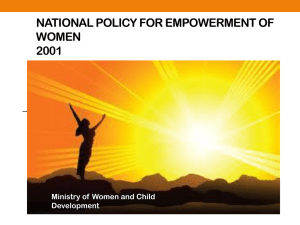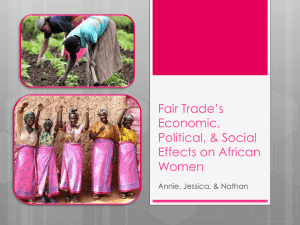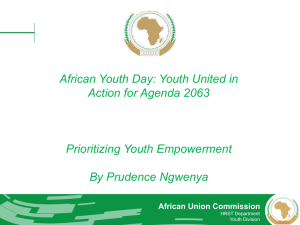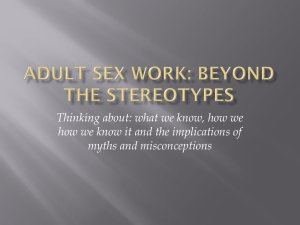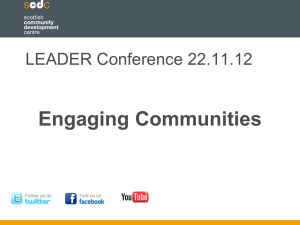BMENA workshop recommendations
advertisement
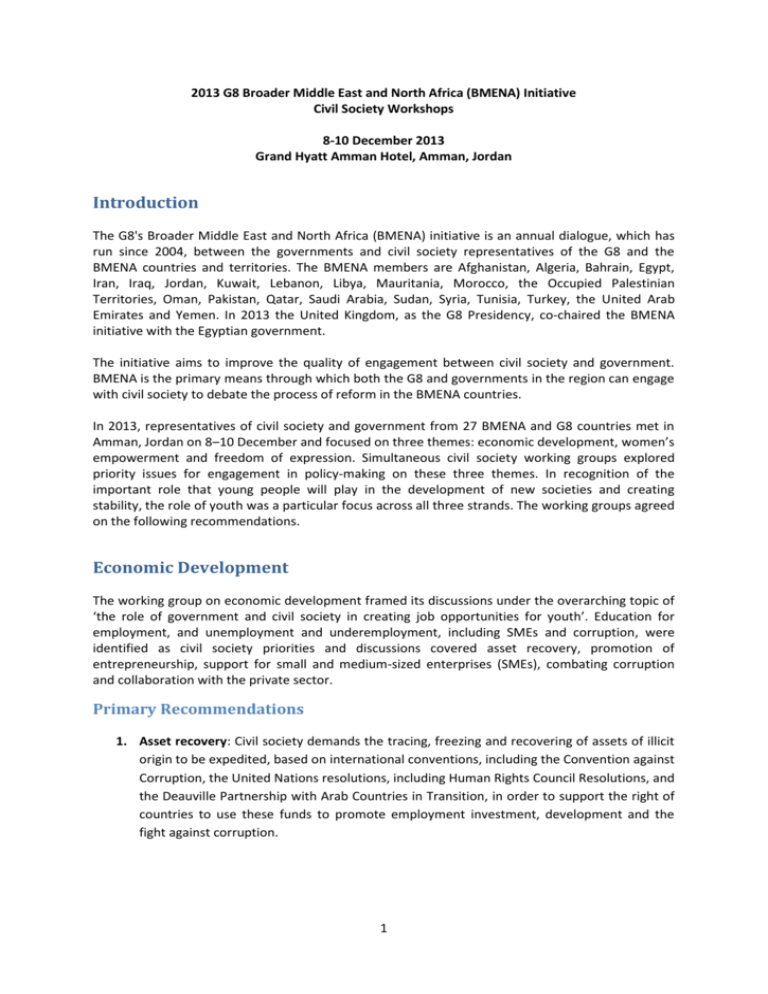
2013 G8 Broader Middle East and North Africa (BMENA) Initiative Civil Society Workshops 8-10 December 2013 Grand Hyatt Amman Hotel, Amman, Jordan Introduction The G8's Broader Middle East and North Africa (BMENA) initiative is an annual dialogue, which has run since 2004, between the governments and civil society representatives of the G8 and the BMENA countries and territories. The BMENA members are Afghanistan, Algeria, Bahrain, Egypt, Iran, Iraq, Jordan, Kuwait, Lebanon, Libya, Mauritania, Morocco, the Occupied Palestinian Territories, Oman, Pakistan, Qatar, Saudi Arabia, Sudan, Syria, Tunisia, Turkey, the United Arab Emirates and Yemen. In 2013 the United Kingdom, as the G8 Presidency, co-chaired the BMENA initiative with the Egyptian government. The initiative aims to improve the quality of engagement between civil society and government. BMENA is the primary means through which both the G8 and governments in the region can engage with civil society to debate the process of reform in the BMENA countries. In 2013, representatives of civil society and government from 27 BMENA and G8 countries met in Amman, Jordan on 8–10 December and focused on three themes: economic development, women’s empowerment and freedom of expression. Simultaneous civil society working groups explored priority issues for engagement in policy-making on these three themes. In recognition of the important role that young people will play in the development of new societies and creating stability, the role of youth was a particular focus across all three strands. The working groups agreed on the following recommendations. Economic Development The working group on economic development framed its discussions under the overarching topic of ‘the role of government and civil society in creating job opportunities for youth’. Education for employment, and unemployment and underemployment, including SMEs and corruption, were identified as civil society priorities and discussions covered asset recovery, promotion of entrepreneurship, support for small and medium-sized enterprises (SMEs), combating corruption and collaboration with the private sector. Primary Recommendations 1. Asset recovery: Civil society demands the tracing, freezing and recovering of assets of illicit origin to be expedited, based on international conventions, including the Convention against Corruption, the United Nations resolutions, including Human Rights Council Resolutions, and the Deauville Partnership with Arab Countries in Transition, in order to support the right of countries to use these funds to promote employment investment, development and the fight against corruption. 1 2. Encouraging entrepreneurialism: Technology-backed entrepreneurship should be promoted by establishing technology/business incubators, providing technical assistance and establishing a fund for students from the BMENA region to participate in training programmes between MENA and global institutions. This would enable the development of an environment for entrepreneurship including better access to markets and capital through export agreements and guarantee funds. 3. SMEs: Growth in labour-intensive sectors should be promoted by supporting SMEs through tax exemptions, industrial zones and modernizing legislation to encourage investment, and streamline bureaucratic processes to encourage companies to register in the formal sector. Supporting Recommendations Education for employment 4. There is a need for mechanisms to build the capacity of both civil society and policymakers in promoting education for employment, by means of mutual collaboration with the private sector as well as business development organizations. 5. Technology must be used as a platform to promote collaboration between civil society, government and the business sector. 6. Further mechanisms to promote education for employment include entrepreneurship education, apprenticeship and vocational programmes and training in soft skills such as innovation, accountability and teamwork. 7. Strong and sustainable collaboration is needed between the private sector and educational organisations in order to identify private-sector labour needs, particularly for graduate level entries to the job market. Educational organizations should then develop methods to teach relevant skills to prospective job-seekers. Corruption 8. Civil society must be involved in adopting and implementing laws and regulations against corruption, including ensuring that they adhere to international standards. 9. Transparent and binding mechanisms are needed for the implementation of anti-corruption laws. Participants emphasized the importance of the values of transparency, integrity, justice and equality. Women’s Empowerment The working group on women’s empowerment framed its discussions under the overarching topics of women’s economic empowerment, women’s security and women’s political participation. Participants noted general areas of progress in women’s empowerment: quotas in favour of women on political party lists were established in the first post-2011 elections in Tunisia, Egypt and Libya; 20 per cent of seats on the Shura Council in Saudi Arabia are now reserved for women; and the National Dialogue Conference in Yemen has a 30 per cent quota reserved for women. 2 Participants agreed that much room for progress remains. For example, the relatively high number of women employed in the public sector has not translated to real influence over public policy affecting women. In addition, while women with advanced degrees are encouraged to set up business or practise law, unemployment disproportionately affects women overall and women in rural areas are even further lacking in opportunities. The growth in conservative groups has worked against women’s progress, and social and family pressures limit their mobility. In recent years, further legislation has been passed to protect women from domestic violence and sexual harassment and there is now increased media sympathy for women who are arrested on public security grounds. However, progress is lacking in the implementation and enforcement of legislation for women’s rights and women’s security in the public sphere remains inadequately protected. Primary Recommendations 1. Women’s economic empowerment: Governments, international partners and civil society must map available resources and services for women’s economic advancement. Career centres should be established to provide women with skills in financial literacy, internet and communications technology (ICT), and entrepreneurship. A joint government–civil society national consultative committee should be established to ensure active compliance with recommendations on women’s economic empowerment. 2. Women’s security: A national strategy to combat violence against women should be adopted by governments in cooperation with the G8 and other international partners. This national strategy should ensure legislation is gender-sensitive, provide training on women’s security to judges and the police force, and increase the number of female judges and police officers. Governments should establish psychological support centres for victims of domestic violence and support civil society in its efforts to combat violence against women. 3. Women’s political participation: There is a need for a mechanism to coordinate at a national level each country’s civil society and government programmes for building women’s political capacity. This mechanism must also establish networks to raise awareness and share best practices for women’s participation in political processes. Governments and international agencies should provide financial and technical support to these national coordination mechanisms, as well as promoting the inclusion of women in all political transition and reconciliation processes. Supporting Recommendations Women’s economic empowerment 4. Governments and international partners should provide women with training in life skills, ICT, entrepreneurship and career counselling in public–private partnerships. Participants affirmed that education is the precursor to the economic empowerment of women. 5. Participants emphasized the value of public-private partnerships in promoting the economic empowerment of women, including in raising their financial literacy and providing them with access to credit. 3 6. Women’s organizations and relevant civil society and private-sector partners should work to advocate decent work conditions for women, including adherence to International Labour Organization standards. Women’s security 7. In order to combat violence against women, governments in cooperation with international partners (G8) should adopt and implement a national strategy to combat violence against women which ensures that legislation is gender-sensitive, to train judges and police, and also to increase the number of female police and judges. 8. In addition to establishing centres for psychological support for the victims of domestic violence, governments should support civil society by playing a role in eliminating violence against women including through media outreach and peer-to-peer contacts between the security services across the BMENA region to share best practice. Women’s political participation 9. Governments and international agencies should provide financial and technical support for a nationally coordinated mechanism comprised of government and civil society organization (CSO) programmes to build women's political capacity, through establishing networks to educate women in their political rights, and enable the exchange of best practice and political experience between them. This education should especially target the participation of women in political processes at the local council as well as national political level, and should include women in all political transition and reconciliation processes. 10. Participants affirmed the right of equal citizenship of all citizens regardless of gender and ethnicity. Governments should implement the Convention on the Elimination of All Forms of Discrimination Against Women (CEDAW) and lift all reservations. Laws that discriminate on the basis of gender should be repealed or replaced. 11. Governments should facilitate dialogues between religious scholars, imams and female scholars, in order to advocate women's rights and spread a positive interpretation of Islamic principles regarding women's rights in order to improve the understanding of concepts which restrict women's participation in public and political life. 12. Governments should recognize women’s role as leaders in politics and public life and as peace-builders; women should be explicitly included by governments and international agencies as equal partners with men (at least 40% each being the aim) in political transition processes. 4 Freedom of Expression The working group on freedom of expression framed its discussions under the overarching topics of education, implementing existing commitments to freedom of expression, and guaranteeing access to information. Discussions further covered freedom of the media, artistic expression, protests and public expressions of dissent, combating hate speech and slander, and the role of independent media, bloggers, and citizen journalists. Primary Recommendations 1. Education: government educational curricula should incorporate raising awareness of human rights and foster freedom of expression. Such a curriculum should be supported by civil society, including media outlets, and by the private sector in design and implementation. 2. Implementing legislation: Governments should more consistently and impartially enforce existing international and national commitments to freedom of expression, specifically by integrating Articles 14 and 19 of the International Covenant on Civil and Political Rights (ICCPR) and the provisions of its Optional Protocols 1 and 2 into national legislation, firmly upholding constitutional commitments to freedom of expression, and lifting restrictions on NGO registration especially restrictions on associations to support journalists. There should be non-discriminatory and consistent implementation of national laws by police and judiciary. 3. Access to information: Governments should make access to information a priority and pass and/or take steps to effectively implement appropriate legislation, which must take into account international standards, the privacy rights of citizens, and national security as defined in the Additional Protocol to the ICCPR. Supporting Recommendations Education 4. Such a curriculum should foster active citizenship and develop soft skills and an open exchange of ideas to encourage critical analytical thinking by students. 5. Education around freedom of expression should include teacher training and utilize technology and extracurricular activities. Implementing Legislation Role of the police 6. Space should be created for dialogue between non-governmental organizations, the police and the Ministry of Interior about human rights concerns. The Ministry of Interior and relevant police forces should seek to meet with peaceful protest groups before planned demonstrations to discuss details of these events and the police of code of conduct. 7. The process for applying for a protest permit should be simplified, and impartial nondiscriminatory application of domestic legislation ensured. 8. There is a need to include civil society issues in police training to provide an opportunity to discuss freedom of expression and assembly. 5 Role of the judiciary 9. Participants reiterated concerns about unfair trials and continued detentions of journalists and called for the release of imprisoned journalists, human rights and democracy activists, and prisoners of conscience. 10. Governments must assure the independence of the judiciary, including by removing any political party requirements for judges and decriminalise violations of restrictive press codes. 11. Trials should be fair, consistent with Article 14 of the International Covenant on Civil and Political Rights (ICCPR) and open to the public. Access to Information: 12. In addition to governments, both civil society and the private sector have a role in ensuring access to information and the verification of information. Both should commit to information, transparency, and concrete measure to curb corruption. 13. Governments should convene all stakeholders including any interested civil society organizations and legal experts to advise on legislation and implementation. 14. BMENA should commit to the creation of a database that collects experiences and best practices from all participating countries on well-functioning access to information procedures and the use of information technology to make information more widely accessible to citizens. BMENA Implementation Mechanisms Several working groups produced the recommendations below for improving the implementation of previous and current BMENA civil society recommendations. 1. Greater attention should be paid to the implementation of previous and current BMENA civil society recommendations, which have been received and recognized by governments. 2. There is a need for a mechanism to monitor and advocate for the implementation of the previous and current recommendations. This mechanism can include a regional network that would work with BMENA governments to evaluate implementation and report periodically to BMENA and G8 governments on specific cases. 3. Monitoring and evaluation indicators should be established to measure implementation on an annual basis. 4. Participants stressed the need for active engagement to ensure that pledged funds are allocated within a specific timeframe. 5. There is a need to establish the details of how to implement BMENA recommendations, such as the role of a secretariat and the use of technology to coordinate across the region. 6
